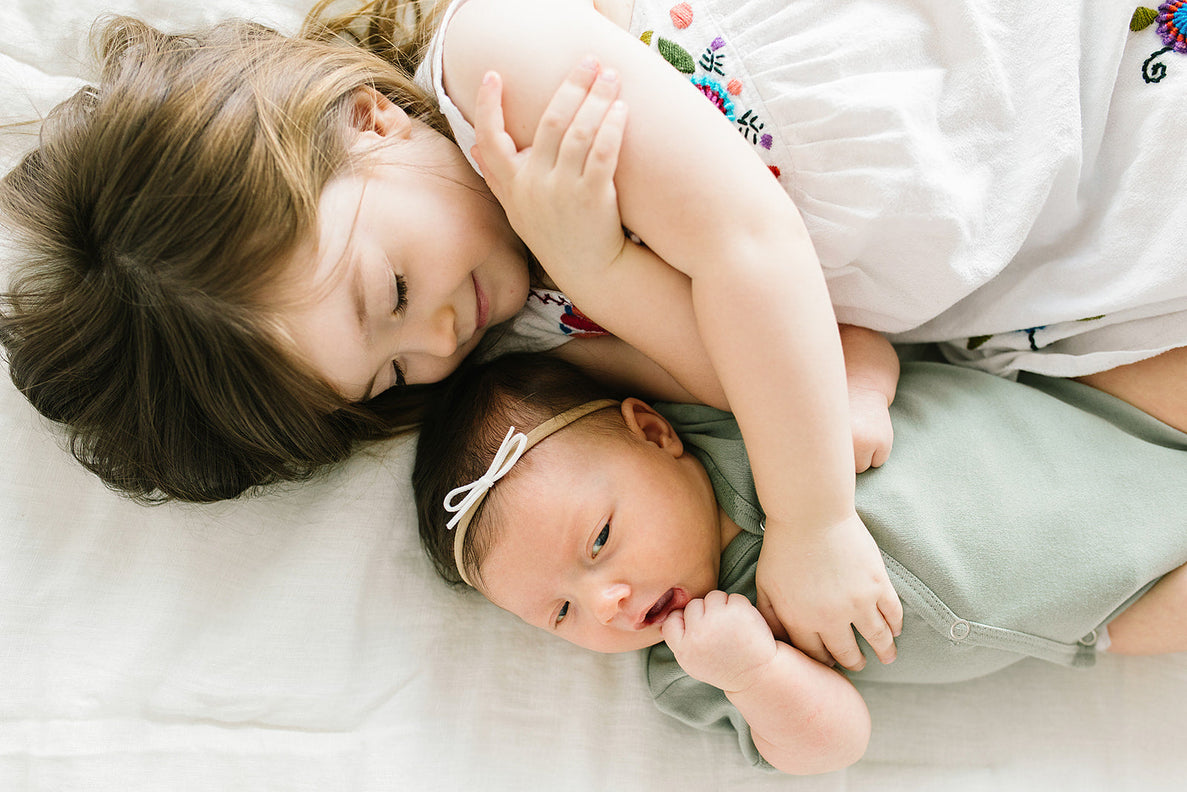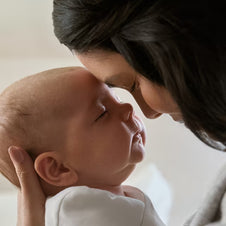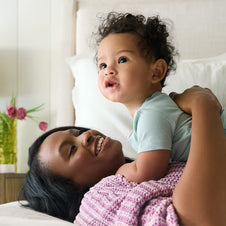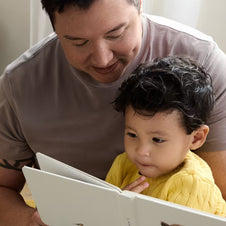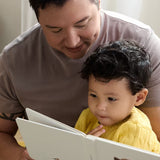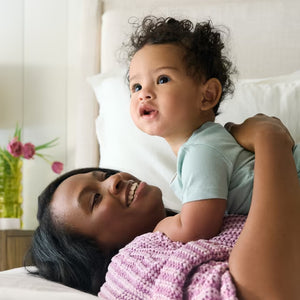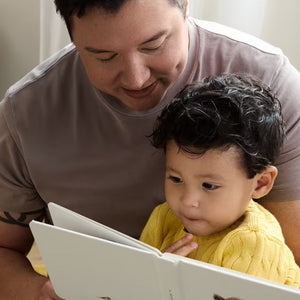Your family is growing! Perhaps you’ve announced on social media that your child is soon to be crowned “Big Brother” or “Big Sister.” This time is so exciting! BUT… you may catch yourself wondering: “How will I prepare for baby number 2? How will I help my toddler adjust to the new baby? How will I introduce the new baby to their sibling?” I know it feels like a lot. But, these are normal feelings as you transition from one baby to two (or three or four). Let me reassure you: “You DO have what it takes to handle your growing family!”
Taking Cara Babies Classes
Let me reassure you:
You DO have what it takes to handle your growing family!
AND
You don’t have to figure all of this out alone, whether your concerns are more about your toddler or more about your newborn. It’s okay if you feel like you “still” don’t know how to do everything perfectly. I have a class for you to help navigate those early days with your newborn as well as classes to help with your older ones, whether they’re 5-24 months old or 2-4 years old. I want you to have the confidence and tools to love this new stage of life with all of your babies.
Can toddlers sense pregnancy?
While there isn’t research that tells us toddlers can sense pregnancy, we do know that toddlers are perceptive. Toddlers mirror our emotions. Perhaps your toddler has been clingier or behaving differently since you found out you’re expecting (even if they don’t know yet). Your toddler may be picking up on a shift in your energy or mood, especially if you’re experiencing physical symptoms. It’s also possible your toddler is simply going through their own developmental progression or experiencing separation anxiety unrelated to your pregnancy. If you’re noticing changes in your toddler’s behavior but don’t quite feel prepared to tell them they’re going to be a big brother or sister, that’s okay. Keep reading for my tips on preparing your toddler for a new sibling.
When should I tell my toddler about a new baby?
How and when you tell your toddler about getting a new baby sibling truly depends on your family. There is no right or wrong answer, so do what feels right for you! Here are a few things to keep in mind as you decide:
-
When planning to tell your child about a new baby, remember to consider your child’s age and maturity. If you have a 3-4 year old, they’ll have an easier time understanding than a much younger toddler.
-
You may want to consider waiting to share the news with your toddler until you are showing. Your growing belly can be helpful in explaining the change that is happening.
-
On the other hand, if you’re having physical symptoms early in your pregnancy, you may want to tell your child what’s happening sooner. Explain what you’re experiencing and feeling in a way that doesn’t place blame on the growing baby.
How do I tell my child about a new sibling?
There’s no perfect, universal way to tell a child they’re going to have a new brother or sister. Consider your child’s context for babies. Is he around babies all the time? Maybe it’s as simple as telling him that we’re going to have a new baby just like his best friend. Is she the youngest child she knows? Maybe a baby doll or talking about a show or book that includes a baby is a good way to start the conversation.
Let your child know in an age-appropriate way how important and special it is to be an older sibling. Use words like “our baby” – instead of “my baby” – to help your child see their connection to the new baby brother or sister.
It’s normal to see a range of emotions with the announcement of a new baby – especially with older toddlers or preschoolers. Your child’s reaction may be happiness, anger, tears, or confusion. It’s all new, and your child may need some time to adjust. If your child is under 3, little or no reaction can be normal since they may not understand the news.
If you are going to make a big announcement or have a party/shower with your family and friends, I would recommend making your toddler as involved as possible in the process!
What is the ideal age gap between siblings?
Truthfully parents, my children have age gaps ranging from 12 months to almost 4 years, and I can say with confidence: the perfect age gap is the one you have. Simply put, life happens, and though we may have an "ideal" age gap in mind, "perfect" timing is rarely within our control.
Let me share with you a few practical tips for the age gap you're about to experience:
Under 2 years apart:
-
Start with a great sleeper. If your child's sleep is a struggle while you're expecting, make that a priority now.
-
Keep your older one in the crib. Transitioning out of the crib too early is a big cause of toddler sleep concerns.
-
Understand that when you have 2 under 2, your little ones may be on opposite schedules.
-
Know that it may feel really tough in the beginning, but it gets really good.
2 or 3 years apart:
-
Start with a great sleeper. If your child's sleep is a struggle while you're expecting, make that a priority now.
-
Consider keeping your older one in the crib if it's still safe. Transitioning out of the crib too early is a big cause of toddler sleep concerns.
-
Parents often feel pressure to potty train during this time. If your child is not showing signs of readiness, don't let this add to your stress as you prepare for a new baby. Know that if your toddler is already potty trained, some regressions can be expected after a new baby arrives.
-
Weaning the pacifier is a common transition at this age as well. We don't want your child to feel like ditching the pacifier is connected to their new sibling, so try to plan for this at least 3 months before or at least 3 months after the baby's arrival.
-
Teach your child about baby safety. We don't want to put blankets or toys in the baby's crib or bassinet. We also don't share food or small toys with the baby.
4 years or more apart:
-
Start with a great sleeper. If your child's sleep is a struggle while you're expecting, make that a priority now.
-
Involve your older child in preparing for the arrival of their new sibling. Maybe they help decorate the nursery or help pick out a special outfit for coming home from the hospital.
-
Check with your local hospital for sibling classes, and have your child watch parts of the newborn class with you. These can be a great confidence boost for your older child.
-
Teach your child about baby safety. We don't want to put blankets or toys in the baby's crib or bassinet. We also don't share food or small toys with the baby.
How can I prepare my child for a new baby?
One of the most important steps you can do to prepare your child for a new baby is to involve them as much as possible in baby prep. Ask for their opinions about the nursery decor, baby names, clothing, or special toys. Any opportunity for your older child to feel included sets them up for a more smooth transition.
I do recommend trying to avoid any big changes in the 3 months before or 3 months after the new baby sibling’s arrival. Becoming an older sibling is a big change, so minimizing other changes will be so helpful. Do your best to avoid moving to a toddler bed, eliminating the pacifier, beginning daycare, or starting to potty train during this period if at all possible. Often, these can wait until your family is a bit more adjusted to the baby.
Another way to prepare your child for a new sibling is to maintain routines as much as you can. Toddlers and young children crave consistency, and this will help them feel safe and secure.
You may also want to read age-appropriate books about the arrival of a new baby or having a baby in the home. This book is a fabulous choice written by a Taking Cara Babies mama!
Expert Tip: Research tells us that little ones who are well-rested are more adaptable. Having a healthy sleep foundation in place for your toddler can help with the transition to becoming an older sibling. If you need help with your toddler’s sleep, I have classes to help. Whether your toddler is younger than 2 years old or 2-4 years old, I’ll walk you through a customizable, emotionally-connected plan that meets your toddler where they are developmentally and helps them achieve independent sleep.
How do I introduce a new baby sibling to my older child?
First, prepare older siblings by telling them about what to expect when they meet their baby brother or sister. Describe what babies are like: "our baby will be tiny," "our baby may be sleepy when you meet them," "our baby might cry and that's okay."
Next, make sure they understand where and how they can touch their baby sibling. For example, encourage gentle hands and kisses on the baby's feet instead of the baby's face. If one of your children is old enough to hold the baby and has expressed an interest, discuss the importance of hand-washing and demonstrate how to safely hold the baby.
Some families like to have their children "exchange gifts." Maybe the older child gives their new baby a handmade card, and the baby gives their older sibling a new baby doll.
Follow your child’s cues and desires during these new sibling introductions, and try not to express disappointment if your older child doesn't react exactly as you hoped or imagined.
Expert Tip: When introducing your newborn to her siblings, do it in a neutral space (like the family room at home or the hospital room) with the baby on a blanket or in a bassinet – instead of being held by a parent. This way your hands are free to give hugs, love, and reassurance to your other children during the first meeting.
How do you handle jealousy between an older sibling and a newborn?
Toddlers and young children often have big emotions and behavioral setbacks after a baby is born. This is absolutely normal. From their perspective, that tiny baby is suddenly the center of your world. Your toddler thinks: “Maybe if I do baby things, I’ll get more attention!” To help avoid jealousy, show your older one all the fun things they can do that babies can’t: play at the park, eat ice cream cones, watch cartoons, color pictures with Mommy, and get piggy-back rides from Daddy.
Aim to have special one-on-one time with your older child each day for at least 10-15 minutes – no younger siblings, no screens, and no other distractions. Make child-directed play the goal; this means your child chooses what and how to play, and you follow their lead. This time is about giving your child the individual attention she needs to feel connected to you, which will make her feel less jealous of the new baby.
Expert Tip: If you see signs that your older child is becoming physically aggressive toward your new baby, be very firm about the boundaries for their behavior. Say “I’m not going to let you hit or throw toys at our baby. Right now, I’m going to hold the baby to keep them safe. If you can have gentle hands, we can try building blocks again.” And then follow through on the boundaries you’ve established. Parents, safety must be our #1 priority.
Will my older child have a sleep regression when the baby comes home?
Maybe! It can be perfectly normal to see some sleep struggles with your older child as the new baby joins the family. There is so much development happening during these early years even without the changes that come from a new baby sibling. We normally see some changes in behavior and sleep at 12 Months, 18 Months, 24 Months, and throughout the toddler stage. Add in a major life transition like a new baby sibling, and it's easy to see why your older child may struggle a bit. If you find you need more hands-on guidance, please know that my Toddler Sleep Training class is here for you.
How do you have bedtime with 2 kids?
A bedtime routine with both a toddler and a baby can feel tricky. But creating a bedtime routine sets everyone up for a more pleasant transition from playtime to sleepy time. Before the baby arrives, build a bedtime routine for your toddler. Having a familiar routine in place will provide the safety, security, and structure she craves while she adjusts to the many changes around her.
After your new baby arrives, bedtime routines may take some trial and error, so give yourself some time and grace to figure out what works best for your family.
Personally, I found baby wearing to be a helpful way to keep my newborn calm while my hands were free to tuck my toddler into bed. Once my older children were snuggled in, I could start the bedtime routine for my newborn.
Wanna see this in action? Watch this mama of 3 handle the bedtime routine (both with her husband and on her own):
How do I manage the daily schedule with a toddler and a baby?
I have good news: newborns actually do best with a flexible routine rather than a rigid schedule. I do usually recommend practicing 1-2 naps in the crib/bassinet each day, but that doesn't mean you have to be locked at home. Use the time when you're already home with your toddler for those crib and bassinet naps, while you allow other naps to be on-the-go in the car or baby wearing. A flexible newborn routine truly is possible while you set up healthy sleep habits from the beginning.
If you need help with a routine or schedule for your toddler, check out Toddler Nap Schedules.
How do I handle school pickups with a new baby?
I have an entire blog on how to handle this situation – check out Baby Naps and School Pickup.
How do you survive a newborn and a toddler? How do you all adjust to the new baby?
First, I need you to hear me: you can do this!
Here are tips I have to help you make it through the newborn stage with a toddler:
Have realistic expectations.
There will be an adjustment period (for you, your spouse, the older sibling, and everyone). Understand that those first few weeks and months may have you feeling a bit out of sorts. Your days feel unpredictable, your body is recovering, and everyone is trying to adjust to this new stage of life. Remind yourself that this is just a season. Try to give yourself (and everyone else) some grace.
Don't let guilt rob your joy.
It will probably feel like you don’t have as much time or attention to give to your second baby compared to your first. And, guess what? You don't. This isn't better or worse; it's just different! As a first-time parent, you did have more time and attention to devote to the baby. It will be different this time, but don’t let shame set in if you feel your attention is divided. Your love for this new baby will be equally strong. Remind yourself that all children who are born second (or third or fourth) face this, and they still grow up feeling loved.
Get out of the house.
It will be more difficult, but it's still important. Getting some fresh air and interaction with the outside world can make a big difference for the entire family. For your older child, maintaining normal activities, like playing at the park or having playdates with friends, will help ease the adjustment to life with a new baby. It also means all of you will get some exposure to daylight, which boosts your mood and helps your newborn avoid day/night confusion.
Create a bin of toys for your older child.
There will be times when your newborn needs nearly all of your attention. Here's a strategy I love: Set aside a bin of engaging toys for your toddler (maybe they're new, maybe your toddler just hasn't thought about them for awhile). Reserve them specifically for when you're doing those newborn things that need nearly all of your focus. This keeps the toys exciting for your toddler when you need that help the most.
Include your older child in your new routines.
Have your child sit with you while feeding the baby. They can feed their doll, or you can read books together. If your child is interested, they could even help by holding the bottle. You can also allow your toddler to hand you diapers, wipes, or diaper cream during diaper changes, or let them wash your baby's toes during baths. Any age-appropriate "job" gives them a chance to be an important part of the baby's care instead of feeling left out.
Narrate everyone’s needs.
There may be times where you can’t respond to your toddler quite as quickly as you did before the baby or where your typical routine needs to shift because of your new baby’s needs. It’s common advice not to “blame” the baby on these changes because we don’t want siblings feeling resentful. But, it’s also important to remember that this new sibling relationship helps your toddler see that someone else has needs too. Use this as a time to narrate everyone’s needs. What does that mean? Well, if you are in the middle of getting your toddler a snack and your baby starts to fuss, say out loud “I’ll be right there baby, I’m getting your big sister a snack.” When you’re in the middle of helping the baby and your toddler needs something, do the same thing (ex. “I’m feeding the baby right now and then I can help you with that puzzle.”). This gives your toddler a chance to hear and see that you are truly trying to prioritize everyone’s needs.
Spend 1-on-1 time with each child.
One-on-one time helps prioritize your bond with each child. It doesn’t have to be long, just 10 minutes a day is perfect. Keep in mind that the 10 minutes should be as distraction free as possible and focus on their interests and needs. Once you get started, I know it will be something you both look forward to all day long.
Ask for help!
As someone who struggles with asking for help, I want to be the first to say: People who love you WANT to help! And asking for help is a sign of strength, not weakness. After the baby arrives, the question “How can I help?” may feel difficult to answer. Make a list while you’re pregnant of things you are doing every day that can be delegated. Think: making meals, running to the grocery store, folding laundry, filling your car up with gas, or taking your older kiddo(s) to the park. You can use that list for ideas when people offer to help.
Lean into your partner.
When the number of children increases, it’s easy to have a “divide and conquer” mentality. Sometimes, this is perfect! It can help everyone maintain sanity and keep things running smoothly. However, making your partnership a priority and doing life alongside one another is important too! Try to plan some activities you can do as a whole family so that you can parent together. And, try to prioritize at least a few minutes each day to connect with one other, just the two of you.
A final thought...
Baby #2 (and #3 and #4) will be different from your first. It’s okay that you “still” don’t know how to do everything perfectly. Each baby will bring his or her own unique set of joys and challenges. (That means my newborn class is for you too! It’s not just for first-time parents.)
Remember these babies were meant to be yours, and nobody could do it better than YOU! You’ve got this!

